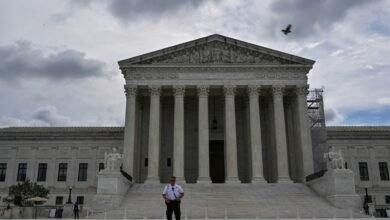Georgia Governor Brian Kemp Signs New Election Law Changes into Law

ATLANTA — Gov. Brian Kemp signed legislation Tuesday that makes additional changes to Georgia’s election laws ahead of the 2024 presidential contest in the swing state, including defining probable cause for removing voters from the rolls when their eligibility is disputed.
Republican activists — fueled by debunked theories of stolen elections — have challenged more than 100,000 voters in the state in recent years. Activists say they are eliminating duplicate registrations and removing voters who have moved out of state.
The bill that Kemp signed into law — SB 189 — lists death, proof of voting or registration in another jurisdiction, a tax exemption indicating a primary residence elsewhere, or a nonresidential address as probable causes for removing voters from the rolls. . Most controversially, the national change of address list can be considered, although not exclusively.
Supporters said defining probable cause would make the challenge process more difficult. Opponents disputed this, saying the changes would allow for more baseless attacks on voters, which would burden election administrators and disenfranchise legitimate voters. For example, sometimes people live in a commercial location, which would be considered a non-residential address. Officials in Georgia Secretary of State Brad Raffensperger’s office say there are more reliable types of information, such as driver’s license data, to confirm a voter’s eligibility.
The Georgia bill also allows challenges to be accepted and voters to be removed from the rolls up to 45 days before the election. That provision has, in part, sparked the threat of lawsuits from liberal groups because federal law says states and counties cannot make systematic changes to voter rolls within 90 days of a federal election.
The measure also states that homeless people must use the county election office as their address, rather than where they live. Opponents said it could make it more difficult for homeless citizens to vote because their registered polling place may be far away.
Fair Fight Action, a voting rights group founded by former Georgia Democratic gubernatorial candidate Stacey Abrams, criticized the signing of SB 189, calling the measure a “voter suppression bill that emboldens right-wing activists in their efforts to kick black and brown voters off the rolls.”
“By signing SB 189 into law, Brian Kemp delivered a gift to MAGA election deniers,” the group said in a statement.
Andrea Young, executive director of the ACLU of Georgia, called the bill a “setback for voter rights and voting access.”
“We are committed to protecting Georgia voters and will see the governor in court,” she said in a statement.
An email sent to governor’s office spokesman Garrison Douglas was not immediately returned.
The bill also grants voting access in Georgia to any political party that qualifies for the presidential vote in at least 20 states or territories. The move could bolster independent candidates like Robert F. Kennedy Jr., whose campaign has spooked Democrats worried about siphoning support from President Joe Biden.
Other changes to the bill include the removal of Raffensperger from his ex officio position on the State Election Board. Kemp and Republican lawmakers had already removed Raffensperger from his voting role on the board.
Many Republicans who believe in debunked theories that former President Donald Trump was cheated in Georgia’s 16 electoral votes in 2020 see Raffensperger as a particular enemy because the Republican secretary of state has vigorously defended the election results showing Biden’s victory.
Raffensperger and a few others lobbied Kemp, himself a former secretary of state, to veto the bill.
The bill further says that starting July 1, 2026, the state will no longer be able to use a type of barcode called a QR code to count ballots created on the state’s voter marking devices. That’s how votes are counted now, but opponents say voters don’t trust QR codes because they can’t read them. Instead, the bill says ballots should be read using text, or human-readable marks such as filled-in bubbles, made by machines.
The bill also requires counties to report the results of all absentee ballots within one hour of polls closing. It also allows counties to use paper ballots in elections where fewer than 5,000 people are registered, although this change will not take effect until 2025.
Kemp on Tuesday vetoed a separate election bill that would ban political contributions from foreign citizens and impose additional registration requirements on agents of foreign principals. The governor noted that such donations are already prohibited by federal law and said some of the registration requirements were not intended by the bill’s sponsor.




